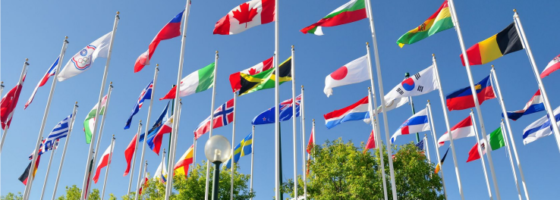Identity is more than where you are from, it is about how you adapt, the experiences you carry, and how you change. This month, Lina, from China, Łucja, from Poland, and Aylin, from Turkey, talk about their journeys between cultures. From the importance of traditional meals and family, to adapting to new environments, their stories show what it really means to live in an international setting.
Where are you originally from, and what part of your culture is the most important to you?
– Lina: “I’m from China, and I would say that the most important part of our culture is how the people cooperate, as well as work together and work hard.”
– Lucja: “I’m originally from Poland. I would say it would have to be food, all Polish food. I really enjoy the food at any family event or gathering. We have many celebrations, even name-days, and the whole family gathers.”
– Aylin: “I’m originally from Turkey. It’s hard to pick something in particular, but as Lucja mentioned too, I really like the cuisine. I also enjoy how friendly and approachable the people are.”
How do you stay connected to your culture while living abroad?
– Lina: “Well, I keep up with social media, and I read Chinese literature, so I can understand more of Chinese culture and language.”
– Lucja: “Here in Croatia, there is a Polish community, and we all gather on special occasions (Christmas, Easter, Polish holidays, etc.) and celebrate together. There is also a Polish school, which I attend, and we also gather there. There are many children there too. So we do have Polish communities, which help us stay connected to our heritage.”
– Aylin: “I try to stay in touch with my friends and family back in Turkey, so I think that’s really important. I also visit often, which is nice. Additionally, I’ve met Turkish people who live here.”
Do you ever feel caught between two cultures?
– Lina: “Definitely, since the culture here and in China is very different. I try to balance the cultures, keep in touch with family, while still indulging here.”
– Lucja: “I have a balance with the culture here and back home. Poland and Croatia are both Slavic countries, so the culture isn’t as different as in other countries, and the language is also very similar, so I can easily understand it.”
– Aylin: “Croatia isn’t insanely different from Turkey, so there isn’t any sort of big cultural shock. It is much easier to balance both cultures than it is in other cases. However, generally, I keep in touch with friends and family in Turkey, as well as here, being a part of Croatia, yet not forgetting about my heritage.”
What is it like moving to a new country? What are the hardest parts?
– Lina: “I’ve never lived in China. I was born in Austria, and then moved here when I was two years old. So, I don’t have a very clear memory of what it was like.”
– Lucja: “Moving here was like moving anywhere else, I expected nice things. I’ve met new people, learned about the culture, and the way people live here. But, the hardest part was leaving friends and family.”
– Aylin: “I have to piggyback off Lucja. The hardest part for me was definitely missing friends and family; however, meeting nice people, learning about the culture, etc., are worth it.”
What helped you adjust when you first arrived?
– Lina: “Again, I was quite young, but I would say my family.”
– Lucja: “It wasn’t the first time moving for me, so I was quite used to it. I like knowing I always have myself.”
– Aylin: “For me, moving wasn’t a big challenge either, but my family definitely helped me adjust, as well as making new friends here did.”
How has your background shaped the way you experience IB classes like TOK?
– Lina: “I think it helps a lot. Having a different background than most people in the class allows me to have a different perspective and come up with new ideas.”
– Lucja: “I would say that my background helps me be more open-minded, and approach things more openly, which is definitely a good thing in TOK.”
– Aylin: “The examples our TOK teacher provides for us always give me an opportunity to think about how being from somewhere else gives me so many different views on things. Experiencing living in a foreign country also gives you a different perspective on the world, which helps a lot in TOK.”
What’s one thing you’ve learned about yourself through being part of an international school?
– Lina: “I’m definitely more open-minded and knowledgeable.”
– Lucja: “I would say that I easily adapt, am more accepting, and tolerant.”
– Aylin: “Simply learning that I can get along with others, no matter their backgrounds.”
Do you feel that being in an international school has helped you understand the world differently?
– Lina: “Yes, because our classmates are from different parts of the world, so we get to hear their perspective on things, hence learning a lot.”
– Lucja: “For sure, you meet new people that are from different cultural backgrounds and have different experiences, which is key.”
– Aylin: “I agree, it helps understand different people more clearly, since you get to know them personally.”
Has living abroad changed how you view your home country?
– Lina: “Definitely, since I am not living in my home country, I see it from a different perspective than someone living there.”
– Lucja: “I think so. Now, when I’m in Poland I appreciate it a lot more (than when I lived there). When I visit, I’m happier, I get to reconnect with people I miss when I am gone, and am more grateful.”
– Aylin: “I also appreciate visiting, and try to enjoy it more than when I lived there. I like being able to understand the language.”
What advice would you give to another student coming from your country and starting school here?
– Lina: “It may not be the easiest at first, but you will learn to adapt.”
– Lucja: “I would tell them to be themselves, that everything works out in the end, and that they’ll adapt quickly and more easily than somewhere else.”
– Aylin: “I would tell them that there is no reason to be afraid, that there is nothing to worry about, and I’m sure that they’ll meet new Turkish people here too.”
Each of these inspiring students shares their unique story, shaped by their traditions, growth, and experiences. What ties them all together is their openness, wisdom, and resilience. Whether it’s celebrating holidays abroad, or adjusting to a new class, Lina, Łucja, and Aylin show us how identities aren’t set in stone, they change and evolve and, in an international school, that’s key!




